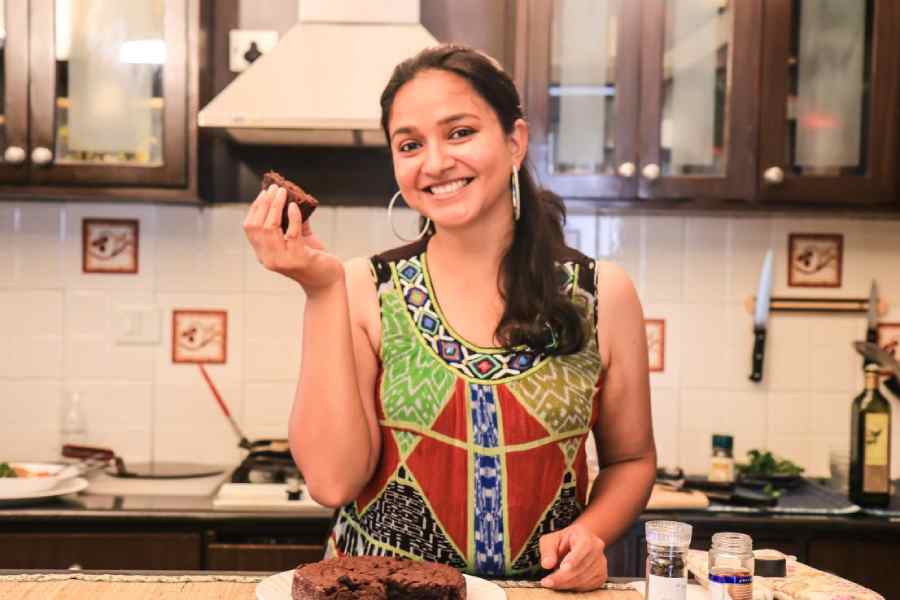Everything about our daily lives is on display these days. The mundane has become watchable thanks to social media platforms like YouTube and Instagram. Daily activities — walking, eating, cooking, cleaning the closet, organising rooms and so on — have thus been given a glamourised edge. Among all these activities, cooking seems to have acquired the maximum visibility. Humble housewives, feeding a vast tribe of eaters, have been transformed into reel heroes. Cooking, arguably, had been rendered ‘invisible’ for ages. The explosion of social media has given these women a chance to display and even monetise their talent, enhancing the possibility of self-worth and independence. But there is a dilemma inherent to this newly-found identity. Does all this visibility not end up consolidating the very stereotypical image that these women have struggled to shed for years?
The question, then, is this: to cook or not to cook in front of the camera? Or even to cook or not to cook at all?
What a priest is to the temple, the woman is to the Indian kitchen. But till now, she did not have the camera as a kitchen companion, concentrating, instead, on dishing out the favourite recipes of her family. Every kitchen is now a studio. The woman is thus facing the camera, smiling at it, even as she dishes out her family’s favourites. Earlier, she would cook delicacies only on special occasions; now, the camera has turned every attempt at cooking into an occasion or a celebration. And on Navratri, Karva Chauth, Diwali or Eid, her kitchen dishes out delicious, pious recipes. The woman, it seems, would never give up serving for the sake of the ‘greater’ good of the household even if she complains occasionally. Since every woman wants to make her family happy, what better way of doing that than cooking? Every woman, from housewives to working women to celebrities, thus wants to join the cooking revolution.
But then who is acknowledged as the real cook? The ones who are cooking in the kitchen without any help, let alone remuneration, or the ones who cook in fancy studio kitchens or restaurants? How many famous restaurants have a woman as a head chef with subordinates — men — taking orders from her? Why is it that celebrity chefs are usually overwhelmingly male? How have men taken control of a profession that is traditionally deemed to be the domain of women?
This is not to suggest that men cannot cook or are inferior cooks. They have proven their mettle given their domination of the position of chefs in restaurants. Does the world know of or remember the American woman chef and author, Julia Child? Or the likes of Nigella Lawson, Ina Garten, Rachael Ray, Anjum Anand or Rachel Allen? We certainly remember our grandmothers cooking for us and teaching us their age-old recipes which they, of course, inherited from their foremothers. But do their names figure in the official history of culinary art? Why does the grandmother continue to remain a passing — minimal — presence in the modern cookery show?
Should one then view the development of the rising visibility of the woman as the cook as a crisis? Is such a visibility meant to be a disadvantage for women? Would women be relieved of their kitchen duties if more men took over cooking, inspired perhaps by the elevated digital status of the cook? Or does the trend have the potential to further confine the woman to the kitchen? Men cooking on TV shows do not inspire more men to take up cooking. There is a line of thought which argues that these shows still target impressionable housewives — women, data suggest, are more likely to watch these programmes — who would like to make such dishes for members of their family. In fact, even working women try their hand at these recipes to not just impress their families but also prove that they have not forgotten the art that allegedly defines their identity as a woman notwithstanding their struggle to become independent.
One might feel that the charge that women do not get enough recognition for their cooking skills is exaggerated. But the question still remains: is the hype around the new-age woman cook worth it? We must not forget to look at data that tell us how much of a woman’s time is spent inside the house, especially the kitchen, on a daily basis. An article in The Economic Times revealed some relevant facts from the findings of a survey conducted in 10 cities of Maharashtra. The most telling among these was that the number of hours spent by women in the kitchen are not only significant but have only increased after the Covid-19 pandemic. Consequently, women are getting to spend even less time on themselves or on their passions.
Are men ready to take up the challenge of replacing the ‘chef’ of the house? One does not know whether or when this question would be addressed or answered. Till then, the kitchen is unlikely to be empty of a woman, with or without a camera in pursuit.
Uttara Bisht is an independent researcher










